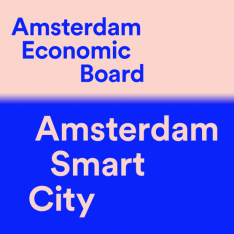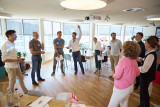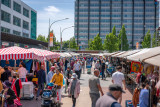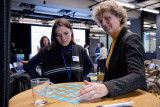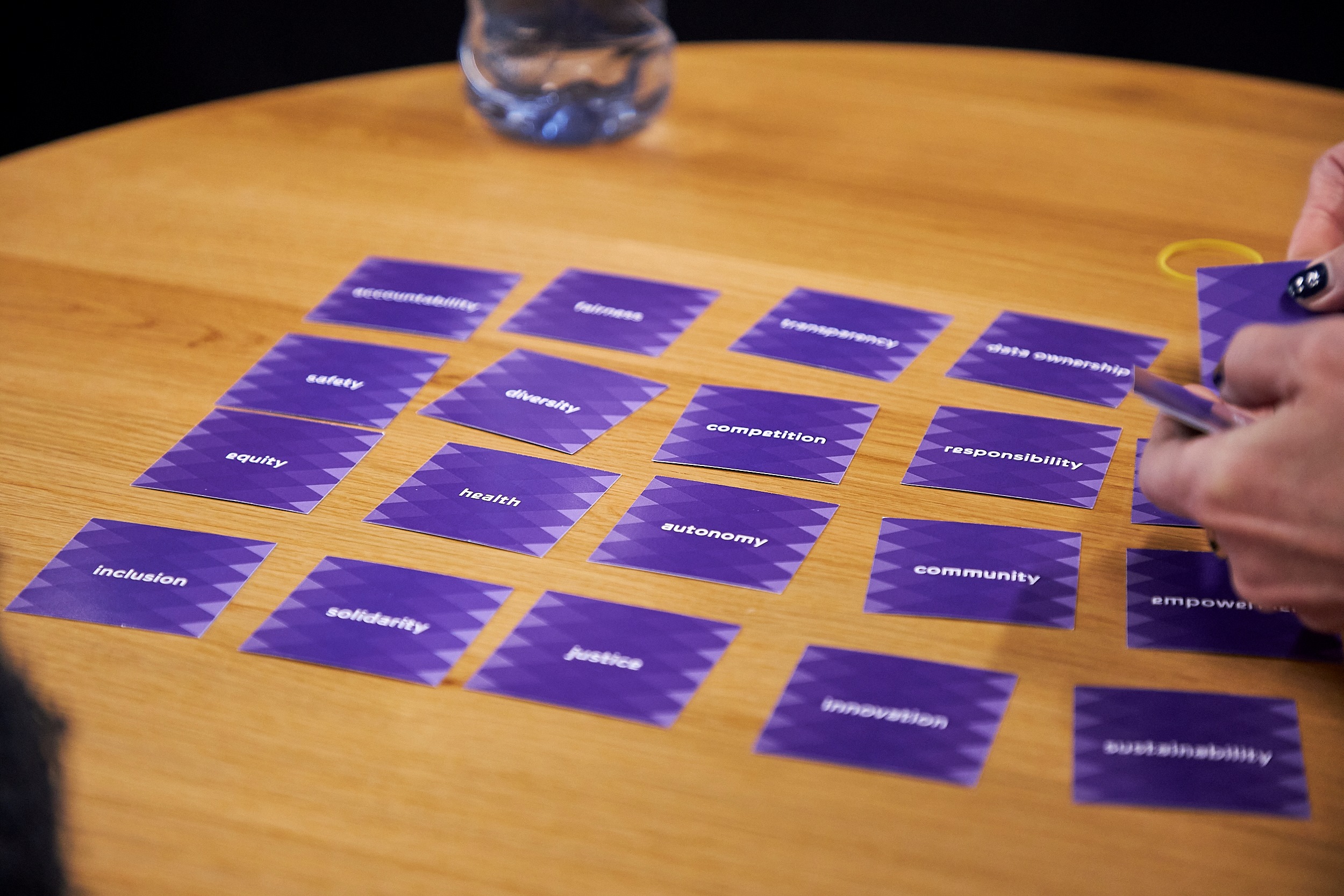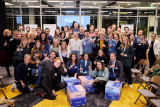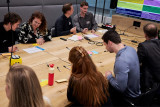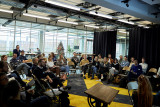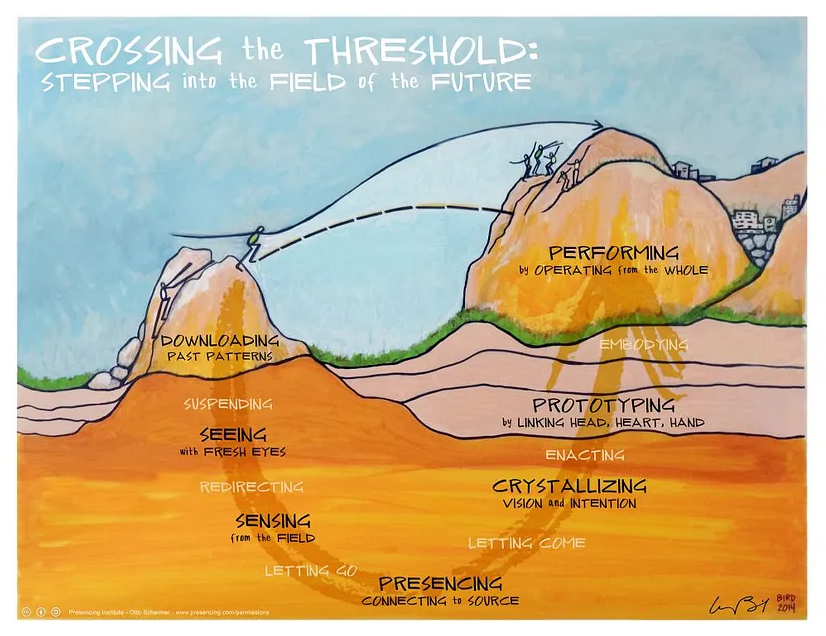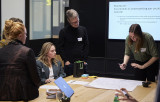Data Dilemma's verslag: Data voor leefbare straten, buurten en steden
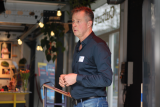
Hoe zetten we Data in voor leefbare straten, buurten en steden? En heb je die datasets echt zo hard nodig? "Of heb je de bewoner al voor je, kun je aan tafel, en kun je gewoon samen van start gaan met een idee?" (aldus Luc Manders).
Op 29 februari kwamen we in een volle Culture Club (Amsterdamse Hogeschool voor de Kunsten) bijeen om het te hebben over Data en Leefbare Wijken. In een fijne samenwerking met onze partner Hieroo en SeederDeBoer nodigden we verschillende sprekers en onze communities uit op het Marineterrein Amsterdam.
Leefbare wijken op de kaart en het visueel maken van data.
Sahar Tushuizen en Martijn Veenstra (Gemeente Amsterdam) namen verschillende kaarten mee om ons te laten zien hoe visuele data weergaven worden ingezet bij het maken van verstedelijkingsstrategieën, omgevingsvisies en beleid.
Een stad is opgebouwd uit verschillende wijken en gebieden. Simpel gezegd; in sommige wijken wordt vooral ‘gewoond’, in andere gebieden vooral gewerkt, en in sommige wijken vindt er een mooie functiemenging plaats. Samen zorgt dit voor een balans, en maakt het de stad. Maar vooral de wijken met een functiemix maken fijne wijken om in te leven, aldus Sahar en Martijn. Door de spreiding van functies visueel te maken met kaarten kan je inzichtelijk maken hoe het nu is verdeeld in Amsterdam, en inspelen op de gebieden waar functiemenging misschien wel erg achterloopt. Stedelijke vernieuwing is uiteindelijk ook een sociaal project. Het gaat niet alleen over stenen plaatsen, we moeten het ook koppelen aan bereikbaarheid en/van voorzieningen.
Sahar en Martijn gebruiken hun kaarten en gekleurde vlekken om de leefbaarheid van wijken terug te laten komen in Amsterdamse visies. Maar de kaarten vertellen niet het hele verhaal, benoemen ze op het einde van hun presentatie. “We gaan ook in gesprek met inwoners hoe functies en buurtactoren worden ervaren en gewaardeerd”. Dit maakte een mooi bruggetje naar de volgende twee sprekers.
Welzijnsdashboard.nl
Hebe Verrest (Professor aan de Universiteit van Amsterdam) nam ons daarna mee in het verhaal van welzijnsdashboard.nl. Een samenwerkingsproject tussen Amsterdamse buurtbewoners (Venserpolder) en onderzoekers van de UvA.
Dit project vond haar oorsprong in twee ontwikkelingen: Er zijn de bewoners die zich niet altijd kunnen herkennen in het beeld dat over hun wijk en economisch welzijn bestaat, en zich niet gehoord voelen in verbeterprocessen in hun eigen omgeving. En dan zijn er ook de wetenschappers die merkten dat data over levens vaak nauw economisch gestuurd is. De data en het meten ervan gebeurt op een hoog schaalniveau, en dus vroegen onderzoekers zich af hoe je op lokale schaal kunt meten met meetinstrumenten die van nature democratischer zijn.
Onderzoekers van de UvA en bewoners van de wijk Venserpolder (Amsterdam Zuid-Oost) creëerden daarom samen een dashboard. De bewoners mochten meedenken wat het dashboard allemaal voor functies had, en het belangrijkste; ze mochten samen de variabele indicatoren bedenken die ze van belang vonden voor de buurt. Met behulp van de samengestelde indicatoren konden ze hun (persoonlijke) ervaringen vertalen naar data over de leefbaarheid en staat van hun buurt. De bewoners ervaarden meer zeggenschap en gehoor, en werden steeds beter in het werken met het dashboard en het vertalen van persoonlijke ervaringen naar wat algemenere data. De onderzoekers leerden met het dashboard over het ophalen van subjectieve, maar bruikbare data. En ten slotte was het voor beleidsmedewerkers en experts een mooie middel om een mix van ‘verhalen uit de buurt’ en abstractere data te verkrijgen.
Het project loopt nog steeds en zal worden toegepast op verschillende buurten. Voor nu sloot Hebe haar presentatie af met een belangrijke learning: "Wat de bewoners belangrijke variabelen vinden, lijken ook die te zijn waar een probleem speelt".
Van data naar datum
Ten slotte hield Luc Manders (Buurtvolk) een inspirerend pleidooi over zijn ervaringen met interventies in kwetsbare wijken. Hoewel data zeker bruikbaar kan zijn voor het signaleren en voorspellen van problemen, wilde hij het publiek tonen dat het uiteindelijk vooral gaat om het in gang zetten van een dialoog en interventie, samen mét de buurtbewoners.
Data kan zeker bruikbaar zijn voor het signaleren en voorspellen van problemen. Het in kaart brengen van risico’s in wijken kan ons tonen waar actie nodig is, maar uiteindelijk gaat leefbaarheid en welzijn over een geleefde werkelijkheid. Het gevaar is dat we blindstaren op data en kaarten en dat we de kaarten ‘beter’ maken, in plaats van iets echt in gang zetten in de wijk zelf. Want ook daar waar de cijfers verbetering aangeven, kunnen nog steeds dingen spelen die we niet weten te vangen met onze data en meetinstrumenten.
Luc noemde zijn presentatie daarom ‘Van data naar datum’. We zouden het iets minder mogen hebben over data, en het méér moeten hebben over de datum waarop we van start gaan met een project, een initiatief of een dialoog met buurtbewoners. Het liefst gaan we zo snel mogelijk met de bewoner aan tafel en zetten we iets in gang. Het begint bij het delen van verhalen en ervaringen over de situatie in de wijk, deze gaan verder dan cijfers die hoogover zijn opgehaald. Dan kan er samen met de bewoners worden nagedacht over een interventie die de wijk ten goede zou komen. Luc benadrukte hierbij ook dat we nog in te korte termijnen denken. Projecten van 2 jaar en professionals die zich 2 jaar in een wijk vastbijten vinden we al een mooie prestatie. Maar interventies in het sociaal domein hebben langer nodig. We zouden moeten denken in investeringen van bijvoorbeeld 10 jaar, zo kunnen we samen met bewoners meer leren van elkaar en meer vertrouwen op bouwen, en hoeven we niet steeds het wiel opnieuw uit te vinden.
Luc deelde ervaringsvoorbeelden, waarbij kleine interventies positieve bij-effecten in gang zetten, en moedigde het publiek aan: "Kosten en investeringen zullen aan de voorkant komen en blijven. Maar blijf het langdurig doen, leer samen met de bewoners, en denk aan het sneeuwbaleffect dat kleine interventies in gang zetten".
Dank aan de sprekers voor hun verhalen en het publiek voor de levendige discussies na afloop. Wil je bij onze volgende Data Dilemma's zijn? De volgende editie van deze serie open events vindt plaats op 30 mei. Het onderwerp en de sprekers worden binnenkort bekendgemaakt via ons platform en LinkedIn. Tot dan!
